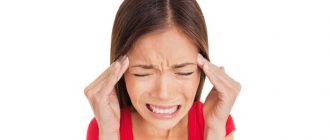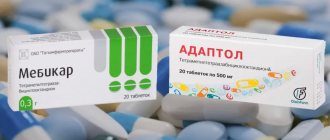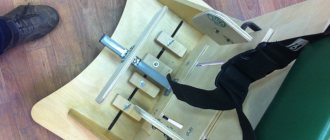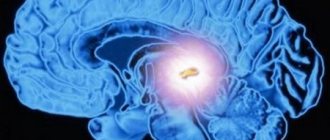Update date: 01/11/2021 15:54:46 7023 Share:
Author: Maria Feldshtein
*Review of the best according to the editors of simplerule.ru. About the selection criteria. This material is subjective in nature, does not constitute advertising and does not serve as a purchase guide. Before purchasing, consultation with a specialist is required.
According to medical statistics, about 4% of the world's population suffers from anxiety disorders. Interestingly, in Europe and North America this condition occurs more often - on average in 7.7% of people, while in Asia - only in 2.8%.
In the treatment of such disorders, drugs of various pharmacological groups are used - in particular, anxiolytics and nootropics. Representatives of these categories of drugs include Afobazole and Phenibut. The drugs differ in composition and mechanism of action, but are prescribed in similar situations. What is the difference between them - read the article.
| The drug and its characteristics | Phenibut | Afobazole |
| Pharmacological group | Nootropic drugs | Anxiolytics - anti-anxiety drugs |
| Active substance | γ-amino-β-phenylbutyric acid hydrochloride | Fabomotizole hydrochloride |
| Release form | Pills | Pills |
| Manufacturer | “Ozone”, “Organika”, etc. (Russia) | OTCPharm (Russia) |
| Price | 60-250 rub. | 300-400 rub. |
| Vacation at the pharmacy | On prescription | Over the counter |
Indications for use
Afobazole and Phenibut have one common indication - the treatment of anxiety disorders. These drugs calm the nervous system, relieve anxiety and fear, and improve the quality of life.
Other indications for prescribing drugs vary
Afobazole
Afobazole is used for certain somatic diseases accompanied by anxiety - for example, VSD, irritable bowel syndrome, bronchial asthma and hypertension. The drug normalizes brain activity, helps lower blood pressure and stabilizes heart rate. Afobazole is prescribed only in combination with other drugs and is not the only drug in this situation - it relieves accompanying symptoms, but does not treat the underlying disease.
Afobazole is also prescribed in the following situations:
- premenstrual syndrome;
- alcohol withdrawal;
- relief of withdrawal symptoms when quitting smoking;
- sleep disturbances caused by anxiety;
- adaptation disorders.
Phenibut
Phenibut is used in more complex cases:
- obsessive-compulsive neurosis;
- insomnia and nightmares;
- enuresis, stuttering and nervous tics in children;
- Meniere's disease;
- open-angle glaucoma;
- symptomatic therapy in the treatment of alcohol dependence.
Phenibut is also prescribed as a premedication before surgical operations and diagnostic procedures.
How do drugs work?
Phenibut and Afobazole contain different active ingredients and differ in their mechanism of action.
Phenibut
Aminophenylbutyric acid hydrochloride, the active substance of the drug, affects the functioning of the central nervous system. Being a derivative of GABA, it acts as an inhibitory transmitter. The drug normalizes metabolism and blood flow in brain tissue. It has a weak anticonvulsant effect - and although it is not used as a drug for the treatment of convulsive conditions, it improves the functioning of the central nervous system,
When taking Phenibut as a course:
- reduces manifestations of asthenia;
- relieves vegetative symptoms;
- eliminates feelings of anxiety and fear;
- improves attention and memory;
- increases mental and physical performance;
- normalizes sleep.
The nootropic drug, according to the official instructions, penetrates all tissues of the body, passes into the brain, is well distributed in the liver and kidneys, but does not accumulate and is released within three hours after administration. In brain tissue, the concentration of the drug remains high for 6 hours.
Afobazole
Fabomotizol in the drug also acts on the central nervous system, but it works through other structures - sigma-1 receptors. The drug restores the sensitivity of these receptors to inhibitory mediators and has a calming effect on the central nervous system.
Afobazole works in two directions at once. As an anxiolytic, it relieves feelings of anxiety and fear, eliminates irritability and tearfulness, helps to relax and normalizes sleep. As a stimulant, it improves brain activity. Afobazole also eliminates vegetative symptoms that occur due to anxiety - sweating, rapid heartbeat, dry mouth, dizziness, etc.
User reviews (taken from open sources)
This year I had to move to another city due to a promotion at work. But, unfortunately, I was not happy for long, because after some time I began to be bothered by severe depression.
I had nightmares at night and didn’t want to get up and go to work. This lasted about a month, then I decided to search the Internet for methods on how to deal with it. After a long search, I chose Afobazole. I went to the nearest pharmacy, bought it, and started taking it according to the instructions.
After about a week, I felt that my life began to change. The old energy returned again, not a trace remained of the experience. The drug really helped me in a difficult life situation.
I would like to appeal to everyone who decided to try Afobazol. I work with children, due to constant fatigue at work and headaches, I decided to try to start taking Afobazol. The side effects indicate that you may have a headache, and this is true.
But even this is not so scary. I did not feel any calming effect, as many say. Two weeks later my condition was terrible. I was constantly crying, screaming at those around me.
I decided to stop taking the drug and see what happens next. Nothing changed. Of course, I understand perfectly well that everyone is individual and perhaps I’m just the type of person who cannot tolerate the drug.
Good afternoon everyone. In the summer, my bosses went on vacation, and they left me in charge of the department. This caused a lot of emotions in me. Panic and stress appeared. And as luck would have it, continuous difficulties began to occur, absolutely nothing worked out.
Colleagues advised me to take sedative pills, namely Afobazol. The result amazed me within a week. I am completely at peace. And most importantly, there were no side effects. Things at work began to go, as they say, uphill.
The product is really good, I have been using it for about two years. The main advantage I would say is that it helps relieve stress and fatigue. Therefore, when I cannot calm down and am worried about something, I always take Afobazol.
After this I sleep well and have no nightmares. And most importantly, I did not notice that it has side effects. Many people write that there is a feeling of drowsiness, but apparently not in my case.
I was bothered by constant pain in my head. After examinations, doctors were unable to find the cause of their appearance. But one day during the examination, epileptic peaks were noted. The doctor decided that it was necessary to undergo treatment.
The first thing she prescribed for me was Phenibut. After I started taking it, the headaches began to bother me less, and after a month they completely disappeared. I was very pleased with the result. Two years have passed, and such incidents have not happened to me anymore.
I started taking Phenibut when I was under severe stress. The management at work had changed, and there was no desire to go there. We spent a very long time getting used to it. As a result, I simply had a nervous breakdown.
I constantly wanted to cry and scream. I went to the doctor and he prescribed me this drug. The effect of it was strong, because after a few days I began to feel some kind of indifference.
The doctor said that the dose should be gradually reduced to avoid side effects. I did not develop any dependence on it, and I was satisfied with the result.
Assessing the effectiveness of drugs
Comparative studies of the two drugs - Phenibut and Afobazole - have not yet been conducted. Since Phenibut is more often used in psychiatry, and Afobazole is used as an adjuvant for mild anxiety disorders, their scope of use usually does not overlap. Therefore, we studied each drug separately and can evaluate them in terms of effectiveness and safety.
Phenibut
In the international medical knowledge base PubMed, there are about 200 articles on the active substance included in the drug - but most of them describe the effect of the drug in laboratory conditions (in vitro). Tests on humans are also available, but they do not meet international standards. For example, there is evidence that the drug:
- tension headaches in children and adolescents;
- fight chronic fatigue;
- used in children;
- helps to cope with;
- alleviates the condition.
But from the standpoint of evidence-based medicine, Phenibut is considered an ineffective drug.
Afobazole
There is also no serious evidence base for Afobazole. They talk about him only in Russian-language literature:
- Afobazole for anxiety and neuroses. There is evidence that the drug acts slowly but effectively: it improves well-being in the 4th week of treatment and causes virtually no adverse reactions.
- Afobazole and for generalized anxiety disorders. Scientists believe that the drug can be used over a long course without reducing its effectiveness.
- There is no mention of this drug in PubMed or the Cochrane Library.
What is Phenibut?
Every person, regardless of age and gender, sooner or later comes to a point in life when depression, nervous agitation, and insomnia appear. Everyone struggles with these factors differently. Some people drink alcohol, some use drugs.
Valerian extract helps many people. But there is another way out of the situation, this is taking a psychotropic drug called Phenibut.
The medicine was synthesized in the 70s of the last century by a famous professor working at a pedagogical institute. After some time, Phenibut was included in the first aid kit of astronauts.
From the instructions it follows that this is a nootropic drug that can calm a person and improve blood circulation in the brain. It has a beneficial effect on the psyche, memory becomes better. Patients forget that they once had insomnia.
This drug is classified as a tranquilizer, but unlike other drugs, it is not addictive.
Phenibut is indicated for use in the following cases:
- State of depression.
- Unreasonable occurrence of fear and anxiety.
- Restless sleep, nightmares in sleep.
- Excitement before upcoming serious events.
- Diseases of the vestibular apparatus.
- Stuttering.
Contraindications
Despite the effectiveness of the drug, it is not suitable for everyone:
Intolerance to the drug by the body.- Pregnant women, as well as mothers breastfeeding babies.
- Children under 2 years old.
- For stomach ulcers.
- While driving a car, as well as in life-threatening situations.
Based on this, you can take Phenibut only after consulting with your doctor.
Compatibility with other drugs
Doctors allow taking the medicine in combination with other psychotropic drugs. In this case, the dose of both should be reduced. There are no side effects with this.
Side effects
For many years, scientists have studied the properties of the drug. As a result, it was proven that no side effects could be caused.
But, based on the fact that each person is individual in his own way, some still experience slight drowsiness, nausea, and irritability.
If suddenly such symptoms begin to change, you need to visit a doctor for consultation.
However, the symptoms do not bother you for more than two or three days, so there is no strong cause for concern.
| Phenibut | Afobazole | |
| Compound | White tablets, round in shape with a chamfer and a score. She tablet contains 250 mg aminophenylbutyrate. | The composition includes active and auxiliary components: milk sugar, povidone, potato starch, mania stearate. |
| Dose | Adults 3 tablets per day. Children under 8 years old - 50 mg 3 times a day. From 8-14 to 250 mg 3 times a day. | Single dose - 10 mg. Take no more than 30 mg per day. |
| Cost, rub.) | Pack of 10 pcs. – 100-200 rub. | 20 tablets – 320 rubles. |
| Side effects | Dizziness, drowsiness, nausea. | Diarrhea, vomiting, feeling of fear. |
Adverse reactions
According to the instructions, the drugs can cause the following symptoms:
- Phenibut: irritability, increased excitability, increased anxiety, headache, dizziness, drowsiness, skin rash. At the beginning of therapy there may be nausea.
- Afobazole: allergic reactions. There may be a headache, but it goes away on its own and does not require cessation of therapy.










